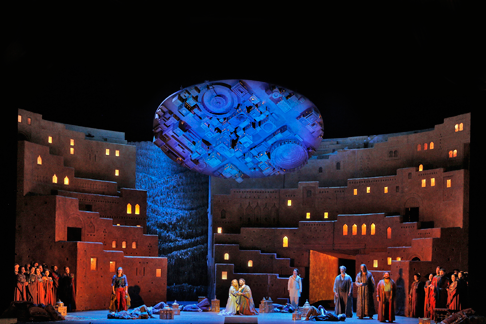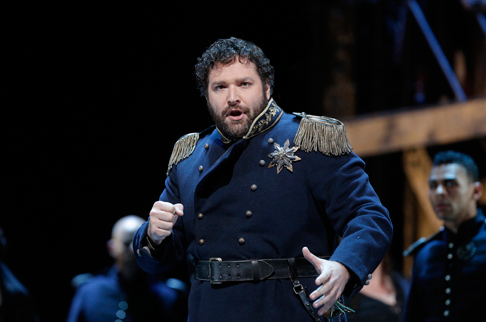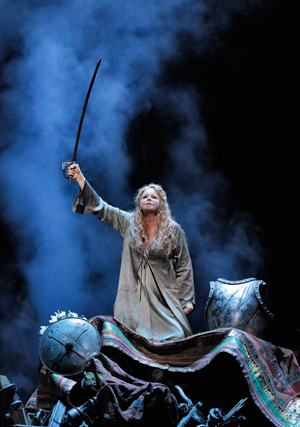![Anna Caterina Antonacci as Cassandra, Brian Mulligan as Coroebus [Photo by Corey Weaver, courtesy of San Francisco Opera]](http://www.operatoday.com/Trojans1.png)
19 Jun 2015
Les Troyens in San Francisco
Berlioz’ Les Troyens is in two massive parts — La prise de Troy and Troyens à Carthage.
English Touring Opera are delighted to announce a season of lyric monodramas to tour nationally from October to December. The season features music for solo singer and piano by Argento, Britten, Tippett and Shostakovich with a bold and inventive approach to making opera during social distancing.
This tenth of ten Live from London concerts was in fact a recorded live performance from California. It was no less enjoyable for that, and it was also uplifting to learn that this wasn’t in fact the ‘last’ LfL event that we will be able to enjoy, courtesy of VOCES8 and their fellow vocal ensembles (more below …).
Ever since Wigmore Hall announced their superb series of autumn concerts, all streamed live and available free of charge, I’d been looking forward to this song recital by Ian Bostridge and Imogen Cooper.
Although Stile Antico’s programme article for their Live from London recital introduced their selection from the many treasures of the English Renaissance in the context of the theological debates and upheavals of the Tudor and Elizabethan years, their performance was more evocative of private chamber music than of public liturgy.
Evidently, face masks don’t stifle appreciative “Bravo!”s. And, reducing audience numbers doesn’t lower the volume of such acclamations. For, the audience at Wigmore Hall gave soprano Elizabeth Llewellyn and pianist Simon Lepper a greatly deserved warm reception and hearty response following this lunchtime recital of late-Romantic song.
For this week’s Live from London vocal recital we moved from the home of VOCES8, St Anne and St Agnes in the City of London, to Kings Place, where The Sixteen - who have been associate artists at the venue for some time - presented a programme of music and words bound together by the theme of ‘reflection’.
'Such is your divine Disposation that both you excellently understand, and royally entertaine the Exercise of Musicke.’
‘And there was war in heaven: Michael and his angels fought against the dragon; and the dragon fought and his angels, And prevailed not; neither was their place found any more in heaven … that old serpent … Satan, which deceiveth the whole world: he was cast out into the earth, and his angels were cast out with him.’
There was never any doubt that the fifth of the twelve Met Stars Live in Concert broadcasts was going to be a palpably intense and vivid event, as well as a musically stunning and theatrically enervating experience.
‘Love’ was the theme for this Live from London performance by Apollo5. Given the complexity and diversity of that human emotion, and Apollo5’s reputation for versatility and diverse repertoire, ranging from Renaissance choral music to jazz, from contemporary classical works to popular song, it was no surprise that their programme spanned 500 years and several musical styles.
The Academy of St Martin in the Fields have titled their autumn series of eight concerts - which are taking place at 5pm and 7.30pm on two Saturdays each month at their home venue in Trafalgar Square, and being filmed for streaming the following Thursday - ‘re:connect’.
The London Symphony Orchestra opened their Autumn 2020 season with a homage to Oliver Knussen, who died at the age of 66 in July 2018. The programme traced a national musical lineage through the twentieth century, from Britten to Knussen, on to Mark-Anthony Turnage, and entwining the LSO and Rattle too.
With the Live from London digital vocal festival entering the second half of the series, the festival’s host, VOCES8, returned to their home at St Annes and St Agnes in the City of London to present a sequence of ‘Choral Dances’ - vocal music inspired by dance, embracing diverse genres from the Renaissance madrigal to swing jazz.
Just a few unison string wriggles from the opening of Mozart’s overture to Le nozze di Figaro are enough to make any opera-lover perch on the edge of their seat, in excited anticipation of the drama in music to come, so there could be no other curtain-raiser for this Gala Concert at the Royal Opera House, the latest instalment from ‘their House’ to ‘our houses’.
"Before the ending of the day, creator of all things, we pray that, with your accustomed mercy, you may watch over us."
The doors at The Metropolitan Opera will not open to live audiences until 2021 at the earliest, and the likelihood of normal operatic life resuming in cities around the world looks but a distant dream at present. But, while we may not be invited from our homes into the opera house for some time yet, with its free daily screenings of past productions and its pay-per-view Met Stars Live in Concert series, the Met continues to bring opera into our homes.
Music-making at this year’s Grange Festival Opera may have fallen silent in June and July, but the country house and extensive grounds of The Grange provided an ideal setting for a weekend of twelve specially conceived ‘promenade’ performances encompassing music and dance.
There’s a “slide of harmony” and “all the bones leave your body at that moment and you collapse to the floor, it’s so extraordinary.”
“Music for a while, shall all your cares beguile.”
The hum of bees rising from myriad scented blooms; gentle strains of birdsong; the cheerful chatter of picnickers beside a still lake; decorous thwacks of leather on willow; song and music floating through the warm evening air.
![Anna Caterina Antonacci as Cassandra, Brian Mulligan as Coroebus [Photo by Corey Weaver, courtesy of San Francisco Opera]](http://www.operatoday.com/Trojans1.png)
Berlioz’ Les Troyens is in two massive parts — La prise de Troy and Troyens à Carthage.
Often these days the two parts are separated by a break of a couple hours thus enabling an audience to transcend the horror of the Trojan slaughter before settling into the beatific idyll of Dido’s Carthage and the fervors of founding Rome.
No such good fortune in San Francisco. It was done as one long moment, over five plus straight hours, its temporal monumentality forced into a single span of unrelenting musical and dramatic intensity. The action was so tightly drawn that British director David McVicar forced Susan Graham’s Dido to stand before a naked black stage curtain to deliver her impassioned adieu to Carthage (while her pyre was rolled onto the scene behind the curtain) — no pause before immediate immolation.
There was not a moment to be wasted in the race to the end.
On good days conductor Donald Runnicles brought the show in at just under five hours.
The McVicar production can indeed boast theatrical efficiency. It was all effected in front of a massive amphitheater shape set, its convex face apparent for Troy, its concave face exposed for Carthage. Both sides of the scenic unit were tiered so that the choristers could be deployed on the structure almost concert style gracefully eliminating the problem of how to stage the massive choruses.
 A scene from Act IV
A scene from Act IV
Carthage was first a floor placed oval platform of miniature buildings on which McVicar’s signature male acolytes cavorted. The platform was tilted on its side and raised high, moonlike (deep blue light) for the garden, and then split, its halves moving to the sides of the stage when the love affair fell apart.
No stranger to heroic proportions the production designer, Es Devlin designed the closing ceremony of the 2012 London Olympics and will design the opening ceremony of the 2016 Rio de Janiero games. Maximum of effect with a minimum of means (someone mentioned there are 35 tons of Trojans scenery). Not to be confused with minimalism.
The McVicar direction was absolutely straightforward. The action was exactly the old story and exactly the music, like the choristers raining confetti onto their queen at the precise moments the Berlioz music spilled into momentary ecstasies. We were simply swept along by the action, no roadblocks to the inexorable destruction of a queen and her city.
Strangely the gigantic Trojan House head was made of bits of industrial revolution detritus plus a Greek shield or two, as was the gigantic torso of Aeneas that would one day squash Carthage. Dress was nineteenth century (a bewildered audience member was overheard explaining that maybe this was because there are a lot of nineteenth century operas so San Francisco Opera has a lot of old costumes that could be used).
If there was a concept besides theatrical efficiency it was not discernible. The McVicar production was heavy on solutions for easy story telling and quick scene changes. These solutions did make those five hours fly by with not a lot to think about!
Berlioz was left in the dust. Berlioz is an iconoclast, a misfit, a dreamer, an egomaniac, and of course a genius. His music is at once naive and brilliant. He absorbed Gluck and Beethoven making them uncomfortable partners. He could write meltingly beautiful music and at the same time relish in pushing harmonic rhythms beyond academic acceptability. It is not easy music.
Furthermore and by the way his estranged wife was an English Shakespearean tragedienne, he detested Rome as much as he detested (and was detested by) the operatic establishment.
 Bryon Hymel as Aeneas
Bryon Hymel as Aeneas
There were many, many fine performances (it is a huge cast) in this San Francisco edition, certainly beginning with the conducting of Donald Runnicles who carefully, even too carefully integrated his musical flow into the slick McVicar storytelling. There was wonderfully direct communication and understanding between the stage and pit in measured — huge or intimate as needed — never unleashed musicality.
Italian mezzo soprano Anna Caterina Antonacci created a riveting Cassandra at the San Francisco premiere, her voice lying comfortably in the role, no hint of the careful control she exerts in creating her higher Gluck heroines, rather she was a beautiful, human Cassandra in warm, strong and open tone and in honest, agonized posture. This made her love duet with her husband-to-be Coroebus, sung by Brian Mulligan, the most splendid moment of these performances. Baritone Mulligan, a catch-all San Francisco Opera regular, here found a role where his voice flowed in quite beautifully smooth, French colored tones, his persona constrained in mannered postures consistent with this brief and sad final encounter with his fiancé.
At the second performance one week later the role of Cassandra was taken by American soprano Michaela Martens. She is known to broader audiences for brilliantly portraying the passivity of Marilyn Klinghoffer both at ENO and the Met. A fine singer with a sizable voice (and career) she does not have the persona or experience to embody this epic character role, begging the question why she was cast.
There is no question that the role of Aeneas currently belongs to American tenor Bryan Hymel. He is handsome and heroic, his voice lies perfectly in the French heroic style pioneered by Berlioz. He has a sound that is uniquely French (he is from New Orleans) the strength of voice to portray a hero, a top that is open, secure and thrilling. Most of all he exudes youth and discovery creating an Aeneas who is emotionally connected to discovering love and discovering the world.
 Susan Graham as Dido
Susan Graham as Dido
Esteemed American mezzo Susan Graham donned the long blond tresses of the tragic queen Dido. Mme. Graham is an exquisite singer, able to elegantly carve the ecstatic and desperate outpourings of this unfortunate, operatically over-exposed queen. Mme. Grahams’ Dido was sculpted art. It was not Dido the tragic queen.
The expanded San Francisco Opera Chorus was magnificent, as prescribed. Operatic ballet is famously maligned (remember the ballet in Samson et Dalila?). Here, if ever, operatic ballet has been exonerated. Sixteen dancers superbly executed the original Covent Garden Broadway style choreography by Lynne Page.
Michael Milenski
Cast and production information:
Cassandra: Anna Caterina Antonacci (June 7); Cassandra: Michaela Martens (June 12); Dido: Susan Graham; Aeneas: Bryan Hymel; Ascanius: Nian Wang; Anna: Sasha Cooke; Coroebus: Brian Mulligan; Narbal: Christian van Horn; Pantheus: Philip Horst; Iopas: Renè Barbera; Helenus: Chong Wang; Hylas: Chong Wang; King Briam: Philip Skinner; Queen Hecuba: Buffy Baggott; The Ghost of Cassandra: Buffy Baggott; The Ghost of Hector: Jordan Bisch; Greek Captain: Anthony Reed; Trojan Soldier: Matthew Stump; Trojan Chief: Jere Torkelsen; Andromaque: Brook Broughton; Polyxena: Rachel Speidel Little. Orchestra, Chorus and Ballet of the San Francisco Opera. Conductor: Donald Runnicles; Production: David McVicar; Stage Director: Leah Hausman; Choreographer: Lynne Page; Set Designer: Es Devlin; Costume Designer: Moritz Junge; Lighting Designer: Wolfgang Göbbel. War Memorial Opera House, San Francisco, June 12 and June 17, 2015.